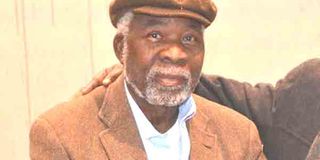Remembering doyen of African literature

Abiola Irele
What you need to know:
More than any other scholar of his generation, Irele brought a forceful intellect, a cosmopolitan outlook, and authoritative voice to the study of African literature in the 1960s and 1970s, a period when it seemed to suffer from a crisis of identity as writers and critics struggled to emerge out of the shadows of colonial English and French studies.
The recent death of Abiola Irele, the distinguished Nigerian literary scholar, at the age of 81, represents a major loss to the fraternity of African letters, and marks the end of an era in the institution of literary criticism in Africa.
More than any other scholar of his generation, Irele brought a forceful intellect, a cosmopolitan outlook, and authoritative voice to the study of African literature in the 1960s and 1970s, a period when it seemed to suffer from a crisis of identity as writers and critics struggled to emerge out of the shadows of colonial English and French studies.
Born in Ora, in the Middle Western part of Nigeria in 1936, and educated in a Catholic high school in Lagos, Irele was a child of the late colonial period, and he grew up with a sense of both the long history of British colonialism in West Africa and its inevitable end. He was one of the first generation of graduates at the new University College, Ibadan, where he followed in the footsteps of Chinua Achebe and Wole Soyinka, and was a contemporary of J.P. Clark, John Munonye, Christopher Okigbo, and Flora Nwapa. Like Achebe and Soyinka, Irele could claim to be part of the generation that invented African literature in the European tradition.
Driven by the fervour of nationalism, Irele’s commitment, like that of other African intellectuals of his generation, was to an idea of Africa liberated from colonial fantasies and post-colonial mythologies. As a student at the University of Lagos, Irele was editor of The Horn, a student journal founded by his classmate, J.P. Clark. The journal was the conduit for the earliest writing by some of the most prominent writers of the period, including Chinua Achebe, Wole Soyinka, and Christopher Okigbo.
I became a scholar because of Irele
In a way, I became a literary scholar because of Irele, whose name I first came across in 1979 when I was working with Henry Chakava and Laban Erapu at the Nairobi offices of Heinemann Educational Books. I vividly remember when the page proofs of Irele’s collected essays, The African Experience, arrived at the Heinemann offices on the ninth floor of International House, and the excitement it generated among us. Here was a mode of literary scholarship that was informed by a keen sense of language (English, French, and Yoruba), a broad sociological imagination, and an unapologetic Pan-Africanism. Irele’s work stood out for its ability to find connections in traditions that were supposed to be disparate and a powerful understanding of the intersection between writing and the drama of African life.
Concerned with the relationship of local events and universal experiences, Irele saw literature as both an intense linguistic act and part of the imaginative representation of the larger ideological movements, most notably Pan-Africanism and Negritude, that were central to the constitution of African identities in the long 20th Century.
Of particular note were Irele’s essays on Negritude and Francophone writing in the Caribbean. His translation of the poems of Léopold Sédar Senghor and Aimé Césaire’s famous poem Cahier d’un Retour au Pays Natal (Notebook of a return to the Native Land) introduced Anglophone readers to the tradition of African and Caribbean writing in French.
Above all, Irele will be remembered as the scholar who refused to work within the boundaries that he had inherited from his colonial education. He rejected the assumed division between writing and orality, insisting on their interface as one of the distinctive aspects of African writing. He rejected the colonial division of Africa into Francophone and Anglophone zones, producing translations and essays that establish the ideological connections between the two traditions.
He rejected the idea that there was an immanent division between African and European languages, a point he demonstrated through a comparison of the works of Amos Tutuola, who wrote in English, and that of D.O. Fagunwa, the most prominent writer in the Yoruba language.
The surprising thing, though, is that Irele, a leading expert on Yoruba literature and culture, was not Yoruba by birth. Born of Endo parents from what was the Middle Western belt of Nigeria, Irele grew up in Lagos among the Yoruba people, he adopted Yoruba as his mother tongue, and celebrated Yoruba identity as his own.
Growing up and coming of age in the 1940s and 1950s, Irele was, of course, a product of the colonial school, or to use a famous phrase from Derek Walcott, the late Caribbean poet, he had a proper colonial education. His friends and colleagues will recall his spontaneous ability to sing scenes from operas by Mozart or Puccini, to recite long verses from Dante (in Italian), and his passion for Shakespeare. And yet this mastery of the European canon was not a barrier to Irele’s devotion to Yoruba, Nigerian, and African culture. He could switch from French to Yoruba to English with ease.
A remarkable thing about Irele’s trajectory at Ibadan and after is that while his classmates took the road to British or American universities for further studies, he decided to go to study in France. Arriving in Paris in 1960, Irele learnt French well enough to study it at the most advanced level, leading to the award of a Ph.D. by the Sorbonne, where he studied under Georges Balandier and Lucien Goldman.




